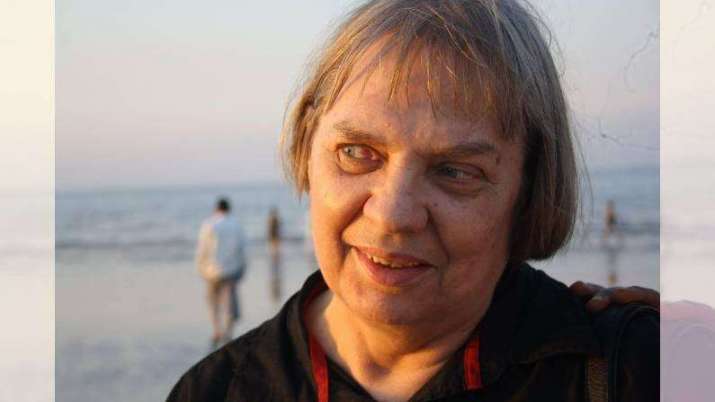NEWS
American-born Indian Scholar of Ambedkarite Buddhism and Gender Equality Gail Omvedt Dies Aged 80
 From news9live.com
From news9live.comAmerican-born Indian sociologist and human rights activist Dr. Gail Omvedt (1941–2021) died on 25 August at her home in Kasegaon in rural Maharashtra, India. Omvedt passed after a prolonged illness, according to family members. She was 80 years old.
Omvedt was born in Minneapolis and studied at Carleton College, before pursuing graduate studies at the University of California, Berkeley, where she earned a PhD in sociology in 1973. During her studies, Omvedt took part in protests against America’s war in Vietnam before traveling to India. There she met and later married Bharat Patankar, a Marxist scholar and activist based in Maharashtra. Omvedt, who had studied the writings of the Indian politician and social reformer Dr. B. R. Ambedkar, was moved by the struggles of India’s lower-caste and “outcaste” people—also known as Bahujans—and she decided to dedicate her life to their struggle.
The term "Bahujan" is Pali and is derived from Buddhist texts, meaning “the many,” or “the majority.” Their political party, the Bahujan Samaj Party, is a nationwide political movement formed to represent groups excluded from India’s caste-based political power structures, officially known as Scheduled Castes, Scheduled Tribes, and Other Backward Classes. These groups—known also, partly, as Dalits or Harijan and Adivasi—combined make up an estimated 85 per cent of India’s population.
The Dalit Intellectual Collective said that Omvedt was one of India’s most original thinkers who did not let caste and class be erased in the feminist movement, noting: “Time is yet to produce another scholar and incisive and capacious thinker like her.” (The Free Press Journal)
Condolences from fellow activists, friends, students, and scholars have poured out on social media.
We are heartbroken for the loss of the irreplaceable anti-caste scholar #gailomvedt. Her towering legacy of Ambedkarite scholarship,organizing, & power building is immeasurable & millions were touched by your heart.Thank you for everything. #Restinpowergail #Jaibhim #Jaisavitri pic.twitter.com/Yvc8lMoGRs
— Dalit Diva (@dalitdiva) August 25, 2021
My mother introduced me to her, and her literature introduced me to a new perspective of Buddhism and Ambedkar. Her work is unparalleled. We lost a gem today but her legacy will live forever. Rest in power! #GailOmvedt https://t.co/VcWLCx82t2
— Mayuri (@Me_mayuree) August 25, 2021
She came from USA to India for study, fell in love with a Bahujan man while studying anti caste movement, married and settled here. Her contribution to anti-caste movement is unparalleled
— Ravi Ratan (@scribe_it) August 25, 2021
We will miss you #GailOmvedt pic.twitter.com/Q78s1DZHbC
Omvedt’s work was wide-ranging, covering topics including caste, gender, economics, tribal issues, and socio-agricultural issues, with a special focus on women. Her publications included: Dalits and the Democratic Revolution: Dr. Ambedkar and the Dalit Movement in Colonial India (Sage India 1994), Dalit Visions: The Anticaste Movement and Indian Cultural Identity (Orient Longman 1995), Growing Up Untouchable: A Dalit Autobiography (Rowman and Littlefield 2000), Buddhism in India: Challenging Brahmanism and Caste (Sage India 2003), Ambedkar: Towards an Enlightened India (Penguin 2005), Seeking Begumpura: The Social Vision of Anticaste Intellectuals (Navayana 2009), and Understanding Caste: From Buddha to Ambedkar and Beyond (Orient Blackswan 2011).
In addition to her, at times blunt, assessment of the evils of caste in India, Omvedt also pointed to the deeply rooted problems of racism in the United States. She not only wrote about social movements in both countries, but also took part in them. In the early 1980s, she and her husband co-founded the Shramik Mukti Dal, a socio-political organization aimed at organizing farmers and other workers to cooperatively address issues such as drought, dams, government and corporate land-grabs, and the presence of caste oppression.
“Dr. Gail Omvedt not only contributed as a researcher in social movements, saints’ literature traditions, but also actively participated in movements for rights of women, deprived sections. She will remain as a scholar who became an integral part of society,” said Maharashtra’s chief minister Uddhav Thackeray. (The Hindu)
Omvedt held positions in numerous universities around the world during her long career. She was a former chair professor for the Dr. B. R. Ambedkar chair of social change and development at the Indira Gandhi National Open University (IGNOU), as well as the head of Phule-Ambedkar chair in Pune University’s department of sociology, professor at the Institute of Asian studies, Copenhegan, and Nehru Memorial Museum and Library in New Delhi, among others. She also worked for the United Nations Development Program (UNDP), Oxfam Novib, and other NGOs.
See more
Researcher, author Gail Omvedt passes away (The Hindu)
Gail Omvedt, voice of Dalits, passes away (Frontline)
Dalit scholar Gail Omvedt passes away in Sangli - Here's all you need to know about the US-born Bahujan movement activist (The Free Press Journal)
Related news reports from Buddhistdoor Global
236 Dalits Convert to Buddhism on Anniversary of B. R. Ambedkar’s 1956 Conversion
Experts Urge India’s Dalits to Register as Buddhist in 2021 Census
Buddha’s Message Highlighted in India’s Celebration of the First Turning of the Wheel of Dharma
Anniversary of B. R. Ambedkar's Death Prompts Marches and Reflection
Dalai Lama Lauds Hindu Priest’s Gesture of Equality for Bearing Dalit Man into Temple
Ten Thousand Dalits Reportedly Embrace Buddhism During Dussehra Festival
Data Shows Improved Literacy Rates, Gender Equality Among Buddhist Converts in India
1,500 Dalits Convert to Buddhism Seeking Social Equality
India’s Dalits Embrace Buddhism on Vijaya Dasami
Related features from Buddhistdoor Global
An Ambedkarite Buddhist Today
A New Birth: Walking on the Path of Buddhism
Being Buddhist in India Today: Seizing Mount Sumeru in the Latter Day of the Law
A Light in the Darkness of the Slums of India
Living Dr. Ambedkar’s Vision














